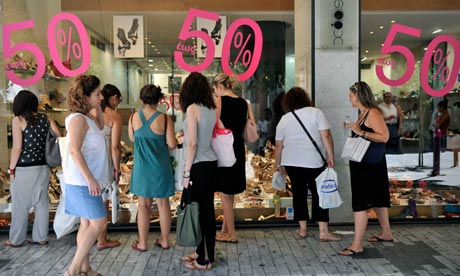Shops, offices and factories close as Greek landlords 'refuse to drop commercial rents to prices that people can afford'
Peter Beaumont in Athens guardian.co.uk, Thursday 4 August 2011 22.00 BST
Traders in Athens are fighting to survive amid Greece's new poverty. Photograph: Louisa Gouliamaki/AFP/Getty
There's a word that is ubiquitous in the Greek capital: Enoikiazetai. For non-Greek speakers it might not be easy to pronounce but its meaning is bland, almost boring. It translates as "To let".
In today's Athens, it is as toxic and omnipresent as a plague notice stuck to the door. You will find it on shop fronts, office blocks and factories, where businesses have withered and died. Too many of them, and you know you're in an area where trade cannot prosper.
It is printed on white banners, strung across the windows of buildings 10 storeys high, and on cheap yellow paper signs plastered on the glass.
Inside one shop in a once busy commercial district, a banner is spread carefully across the floor, held down at its corners, visible only if you look through the window. On it is a telephone number. A few phone calls later, the failed history of the building starts to become clear.
The first call reveals that the premises used to be a doctor's surgery. Another call yields a firm of liquidators of failed insurance companies. The man who answers will not give his name but lists half a dozen companies that have gone under. His job, he says, is to rent out the building to help pay off the creditors; he has not managed to do that. George Fatoulis answers another call. He owns the building and once rented the ground floor to Toyota for a car showroom.
A woman answers the phone number displayed on the next empty property, again a car showroom. Like others, she does not want to give her name but says the company that rented her ground floor stopped paying and she threw it out.
A final call reveals Antonis Diamantaras, director of real estate company Ktirio Act, who with his colleague Dimitris Atzinas is happy to show the Guardian around some of the commercial properties he has on his books for rent.
Many of the buildings, he says, are owned by families. Near his own offices in Nea Smirni the majority are owned by just seven of them. "What I see is a country that is still not ready to confront this crisis," he says gloomily. Many of the landlords he represents are not willing to drop their rents to prices that people are willing to pay. Some 75% have unrealistic expectations and he has no idea how far the market will yet fall. One building has been on his books for four years.
"We have another building that belongs to a family with each of the floors owned by a different family member," says Diamantaras. "The family member who owns the first floor wants €12 a metre, the one who owns the second €16 a metre, and the third €14 a metre. At most it is worth €10. Only one of them is close to that."
The consequence is a proliferation of empty buildings and shops across the city, all labelled Enoikiazetai.
Diamantaras takes us to an empty, five-storey office block, once occupied by an insurance company, swelteringly hot with no power now to cool it. It is a hollowed-out husk empty of everything that once made it a busy workplace.
"When you go to a place where people used to work, where there once was life, it makes you feel miserable," says Atzinas. "If you go out in the streets of Athens everyone is saying the same thing, all the shopkeepers and small businesses. They'll say: 'No one bought anything today.' "
Shopkeepers blame Greece's new poverty. They blame immigrants selling cheap knock-offs – although in truth few of these are visible – and the Chinese "euro shops" that sell articles cheaply.
Marianna Pagoni of the Athens chamber of commerce – found in one of the city's most chi-chi streets where jewellers shops jostle shoulder to shoulder with high-class boutiques, and wealthy women still patrol the cafes and the shops – has a similarly jaundiced view.
Her shop – one of a chain of three – sells ties and silk scarves, some costing as much as €400. She is fortunate in that she owns the buildings where her businesses are located."We fell into the trap of the rush for Greek growth," she says. "Then it was like someone pushed a button and it was catastrophe. I'm afraid we don't have an understanding government or politicians."
Despite owning her own properties, her business has not been immune to the financial crisis. She fears she may have to close two of her three Athens outlets if trade does not pick up.
Then there will be two more signs reading Enoikiazetai to join the thousands of others.
Athens is plastered with one message: enoikiazetai. To let | World news | The Guardian
![The [Greek] European Tragedy](https://blogger.googleusercontent.com/img/b/R29vZ2xl/AVvXsEiWKI5s90SFm1wWTk6bs4p7CgslaC2SnYPsrZhb-B-smOufNNCSxCvpBLI9hOB-LsXZjir_PNmEiMk2-E62F3xkg96IoC6QFAaZAnPRTVH340IN9WBRmWJqPkjWlgyRj3zpALp7h6hvA58/s920/GkBack_new.jpg)

